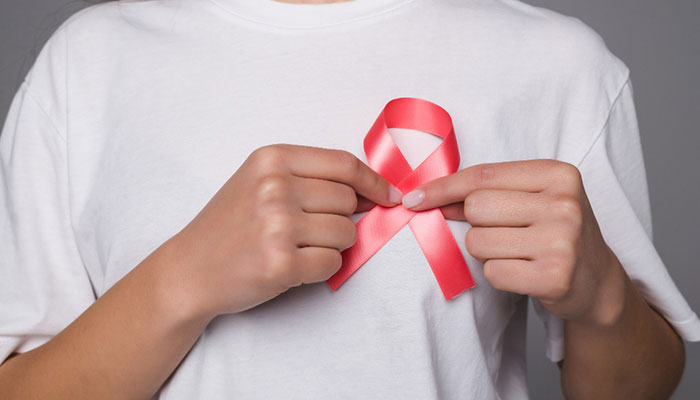The breast consists of three major components: lobules, ducts, and connective tissue. Lobules are milk-secreting glands, ducts are milk-transporting tubes to the nipple, and connective tissues, made up of fibrous and fatty tissue, surround and hold everything together.
Breast cancer is a condition in which the breast cells grow and divide uncontrollably, forming a mass of tissue called a tumour. Various breast cancers include Infiltrating (invasive) ductal carcinoma, ductal carcinoma in situ, infiltrating lobular carcinoma, lobular carcinoma in situ, triple-negative breast cancer, inflammatory breast cancer, and Paget’s disease of the breast.
Signs and Symptoms of Breast Cancer
- Noticeable change in the breast (size, shape, and contour)
- Lump as small as a pea in the breast region
- New lump in the breast or underarms that persists throughout the menstrual cycle
- Pain in the breast region
- Irritation of the skin
- Redness in the nipple area
- Pulling in of the nipple
- Nipple discharge other than breast milk
Causes of Breast Cancer
- Advanced age (55 years or more)
- Gender (women are much more likely to develop breast cancer)
- Smoking
- Alcohol use
- Obesity
- Radiation exposure
- Hormone replacement therapy
- Family history and genetics
Understanding Breast Cancer in Ayurveda
According to Ayurveda, imbalances in the three doshas (Vata, Pitta, Kapha), poor diet, lifestyle choices, and emotional stress can contribute to breast cancer. These imbalances can affect the body’s ability to detoxify, leading to the formation of toxins or “Ama” in breast tissues, potentially increasing the risk of cancer.
Treatment and Management
Breast cancer treatment depends on the cancer type and stage. Common approaches include surgery (mastectomy or lumpectomy), chemotherapy, radiation therapy, targeted therapy (like HER2 inhibitors), hormone therapy (for hormone receptor-positive cancers), and immunotherapy. Treatment plans are personalized, aiming to remove or control the cancer and minimize its recurrence.
Care offered by SGP’s PSA has been demonstrated to be effective in alleviating symptoms and enhancing the quality of life for patients with breast cancer. The primary focus of care delivered by the PSA is to manage symptoms, address emotional and psychological distress, and improve overall comfort.
FAQs about Breast Cancer
-
Breast cancer is diagnosed through a combination of investigations, including mammograms, clinical breast exams, biopsies, and imaging tests like ultrasound or MRI. Early detection is vital for successful treatment.
-
Breast implants themselves do not directly cause breast cancer. They may, however, have an impact on the detection of breast cancer. Silicone or saline breast implants can make it more challenging to detect breast abnormalities through mammograms, potentially delaying diagnosis.
-
Estrogen plays a significant role in breast cancer as it can promote the growth of hormone receptor-positive breast tumours. These cancer cells have receptors for estrogen, making them more susceptible to their development and progression. Hormone therapy may be used to block oestrogen effects in such cases.
-
Yes, breast cancer can spread to other body parts. This is known as metastasis. Initially, breast cancer may be confined to the breast tissue (in situ or localized), but if it’s not treated or if it becomes more aggressive, it can spread to nearby lymph nodes and, eventually, to distant organs like the lungs, liver, bones, or brain. Early detection and appropriate treatment can help prevent or manage metastasis.
-
Reducing the risk of breast cancer involves maintaining a healthy lifestyle, including regular exercise, a balanced diet, limiting alcohol consumption, not smoking, and managing weight. Additionally, staying informed about risk factors and participating in regular screenings and self-exams can help with the early detection of breast cancer.






